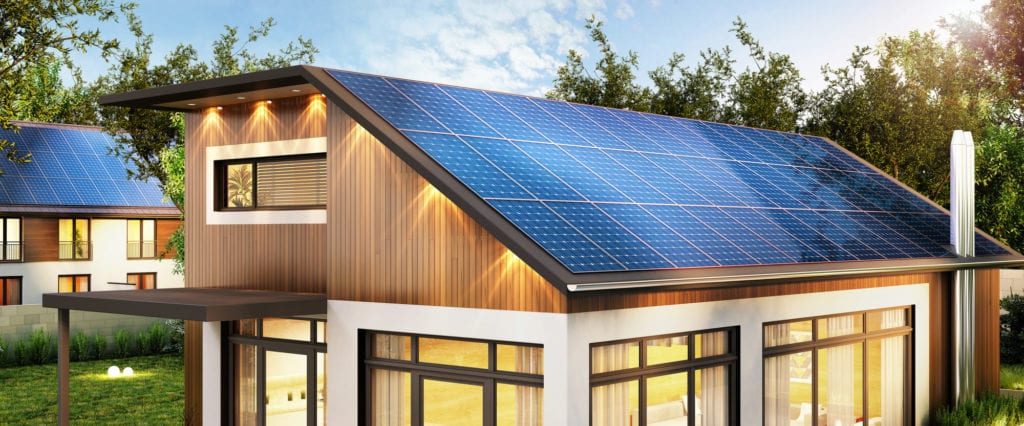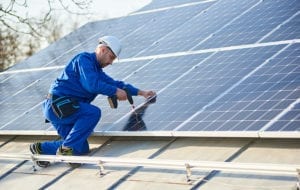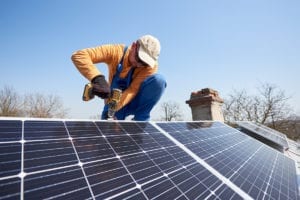How Much Does Solar Installation Cost?
Residential solar panels typically range in sizes between 3kW to 8kW and have a national average cost between $24,000 – $44,523. Of course, the biggest driving factor will be determined by how many panels you want to have installed on your roof. Most homeowners will also see additional tax credits and discounts.
Using solar energy for your home requires knowing it can fit your budget. This guide answers the question, “How much does solar installation cost?”.
In recent years there has been a surge in the domestication of solar energy. Many homeowners have looked at solar installation cost as a worthwhile investment for an individual’s economic and environmental benefit.

Because of the recent growth of the solar industry, solar power has become more attainable for residential use. State and federal governments have collaborated to improve the accessibility of household solar systems.
If you are environmentally-minded and are looking for an investment opportunity to cut your expenses and make you energy independent, make the switch to solar.
What Is Domestic Solar Power?
Solar power is the use of solar panels to convert light from the sun into usable electricity. Domestic solar power is the collection and use of the sun’s energy to power a home.
You can install solar panels on your home to harness the energy from the sun. When the sun’s light makes direct contact with these panels it will absorb the light and convert it into an electrical current.
The sun’s energy is converted through photovoltaic panels and carried through a wire to the electrical panel’s inverter. Once inverted, the energy is put into the residential home’s electrical grid.
What Are the Pros and Cons of Solar Panels?
When deciding to invest in solar panels it is important to determine the pros and cons of a domestic solar system.
Pros of Going Solar
Investing in a solar system for your home can allow you to cut electricity costs. This is a wise investment for you to make when improving your home.

Installing a solar system for your home is an effective way to use renewable energy to power your household needs. This is a very environmentally friendly method of producing energy, primarily in contrast to depleting the supply of limited resources such as fossil fuels. Clean energy sources, such as solar, allow you to power your home without producing greenhouse gases or polluting.
Solar panels are able to shrink your household’s carbon footprint. You can mitigate your carbon footprint by enlisting the use of renewable resources. This allows users of residential solar systems to produce the necessary energy to power their homes while lowering their carbon emissions by 80%.
Switching to solar energy will allow you to slash your unhealthy use of fossil fuels. Clean energy sources, such as solar, allow users to manage a system that even produces minimal emissions during the solar production process.
Once you have installed your solar system, there are minimal maintenance costs. You can keep your system fully operational for a minute cost and minimal care. This system is not mobile, therefore does not endure wear and tear over the years.
The value of your home can increase with the addition of a solar system. This added benefit can not only have a positive effect on your day-to-day living but also be evident in the sale of your home as well.
By integrating solar energy as a feature of your home, you can make your home more self-sufficient and ecologically friendly.
Cons of Going Solar
Although solar power is a cost-saving solution for many homes, it is not for everyone. Before you take the steps to become a solar system owner you must analyze your situation to determine if solar is right for you.
Solar panels do not work for every roof type and require a sizable amount of surface area for installation. You need to consult with an installation company before purchasing these large panels. By consulting these individuals you can ensure that the panels will fit properly in your home.
Every home’s roof has a unique solar potential. Depending on where the house is geographically located and if there are any large natural sources of shade, your home may not have a suitable solar potential for installation.
Buying your solar system can be expensive. If you are not ready to make a large investment you must wait until later to purchase your solar system.
Calculate to Cost of Solar Near You
| State | Average Cost: 6-kW system | Cost per watt | Apprx federal tax credit value | Estimated Federal tax credit value |
|---|---|---|---|---|
| Alabama | $13,900 | $2.49 | $3,604 | $3,125 |
| Alaska | $13,554 | $2.45 | $3,533 | $3,000 |
| Arizona | $13,854 | $2.77 | $3,600 | $3,120 |
| Arkansas | $14,900 | $2.68 | $3,888 | $3,300 |
| California | $15,500 | $2.69 | $3,969 | $3,360 |
| Colorado | $17,500 | $2.54 | $4,450 | $3,780 |
| Connecticut | $15,670 | $2.93 | $4,098 | $3,455 |
| DC | $15,990 | $2.99 | $4,127 | $3,528 |
| Delaware | $15,945 | $2.73 | $4,005 | $3,420 |
| Florida | $14,5000 | $2.44 | $3,699 | $3,072 |
| Georgia | $16,000 | $2.38 | $4,200 | $3,550 |
| Hawaii | $20,550 | $2.71 | $5,121 | $4,380 |
| Idaho | $17,900 | $2.66 | $4,523 | $3,082 |
| Illinois | $16,970 | $2.60 | $4,452 | $3,685 |
| Indiana | $15,800 | $2.51 | $4,200 | $3,776 |
| Iowa | $14,430 | $2.55 | $3,711 | $3,160 |
| Kansas | $13,708 | $2.44 | $3,500 | $2,910 |
| Kentucky | $13,575 | $2.41 | $3,422 | $2,899 |
| Louisiana | $15,889 | $2.39 | $4,142 | $3,555 |
| Maine | $16,300 | $2.89 | $4,291 | $3,912 |
| Maryland | $15,800 | $2.81 | $4,218 | $3,559 |
| Massachusetts | $16,440 | $2.89 | $4,373 | $3,777 |
| Michigan | $16,400 | $2.70 | $4,192 | $3,528 |
| Minnesota | $17,600 | $2.77 | $4,501 | $3,802 |
| Mississippi | $14,900 | $2.68 | $3,990 | $3,330 |
| Missouri | $15,761 | $2.62 | $3,808 | $3,822 |
| Montana | $17,200 | $2.44 | $4,378 | $3,700 |
| Nebraska | $16,440 | $2.87 | $4,200 | $3,500 |
| Nevada | $14,960 | $2.63 | $3,900 | $3,300 |
| New Hampshire | $18,460 | $2.84 | $4,590 | $3,899 |
| New Jersey | $15,450 | $2.79 | $3,895 | $3,300 |
| New Mexico | $17,000 | $2.48 | $4,421 | $3,970 |
| New York | $16,400 | $2.87 | $4,250 | $3,667 |
| North Carolina | $14,110 | $2.49 | $3,703 | $3,339 |
| North Dakota | $13,700 | $2.45 | $3,609 | $3,008 |
| Ohio | $14,900 | $2.52 | $3,889 | $3,221 |
| Oklahoma | $14,667 | $2.64 | $3,900 | $3,201 |
| Oregon | $15,550 | $2.55 | $3,999 | $3,370 |
| Pennsylvania | $15,700 | $2.39 | $4,078 | $3,400 |
| Rhode Island | $16,340 | $2.73 | $4,300 | $3,667 |
| Sourth Carolina | $16,560 | $2.66 | $4,360 | $3,700 |
| South Dakota | $13,888 | $2.41 | $3,669 | $2,999 |
| Tennessee | $14,500 | $2.50 | $3,670 | $3,232 |
| Texas | $15,900 | $2.63 | $3,909 | $3,260 |
| Utah | $15,880 | $2.68 | $4,110 | $3,435 |
| Vermont | $16,770 | $2.89 | $4,400 | $3,700 |
| Virgina | $16,334 | $2.71 | $4,200 | $3,500 |
| Washington | $14,450 | $2.76 | $3,700 | $3,289 |
| West Virgina | $14,990 | $2.68 | $3,900 | $3,321 |
| Wisconsin | $17,880 | $2.64 | $4,609 | $3,995 |
| Wyoming | $14,700 | $2.59 | $3,789 | $3,223 |
Do Solar Panels Lower Your Electricity Bill?
Installing solar panels is a great way to lower your electricity bill. Solar panels allow you to not only utilized energy but also stockpiling for later. Although a solar system can have a large input cost, residential solar systems are an investment that can lower your electricity bill.

A major hesitation for potential solar owners is that solar systems are too dependent on the weather. If you fear that the weather in your region may not be fit for solar, consult an installation company. Solar batteries, however, allow users to collect solar energy during optimal weather that can be stored for later use during poor weather conditions.
Not only can you store this energy for later use but the batteries have their own converters able to store and convert that additional energy that is taken from the sun. In some cases, individuals will even sell back excess energy stored in batteries to the electric company. If you produce enough energy to do this you can get payments from your utility supplier.
The energy that your residential solar system can produce will replace the energy you were paying for from the electric company. Solar panels have the ability to immediately cut your utility bills by using clean renewable energy.
Once you get connected to your local energy grid, you’ll be able to start generating energy for your own use. The energy company will monitor the amount of energy produced by your solar system and adjust your bill accordingly if you’re not fully self-sufficient.
How to Install Solar Panels
Installing solar panels can be a very rewarding endeavor for any homeowner. However, before you go out and purchase solar panels, you want to define your electricity needs establish your home solar potential and consult with installation companies.
Define Your Electricity Needs
In order to know how beneficial a solar system will be for your home, you need to know your annual electricity consumption. By compiling your electricity bills over the past year you can add up your monthly electricity usage.
What you were looking to find is the total kilowatt-hours (kWh) per year. It is reported that the average American household uses approximately 11,000 kWh per year.
Find Your Home's Solar Potential
Not every home has the same solar potential. Solar potential is defined as the amount of direct sunlight that you were home receives.
The sunlight is then converted into useful energy through a solar system. Approximately 100 square feet of sun-exposed roof is required to find every kWh of energy.
Once you use a sun mapping tool, you can determine how much solar potential your home has. You can then compare your home's solar potential with your annual energy consumption rate.
Shop for Solar Panel Installation
Installing solar panels is a relatively simple process. Because of the growth in the private sector of solar, there has been enough competition amongst different industries to drive the cost of solar panels down.
When consulting different solar system installation companies you want to look at the variety of price options. Because they’re such a wide range of costs, it’s important to consult a variety of installation companies to get the best bid on your solar system.
Look into different financial incentives that your state or county may provide when switching to solar. This can help make solar panels and more affordable investment for you.
Is the Solar Installation Cost a Good Investment?
The biggest deterrent in switching to solar is the initial cost of solar panels. It’s important to consider the energy potential your home has and your annual usage of energy when deciding to make this investment. However, if your home is in a sunny area that receives large quantities of direct sunlight it is a great idea to invest in a home solar system.
An added benefit to installing a residential solar system is that you are able to reduce your dependency on renewable energy sources. As the supply of traditional energy, such as fossil fuels, has depleted energy costs have begun to fluctuate.
By installing solar panels you were able to protect yourself from the fluctuation of energy costs. You can see this reflected in how easily the cost of gasoline fluctuates. So make the switch to clean energy and minimize your dependent on unstable and unrenewable energy sources.
Installing a solar system will allow you to become energy independent, boost the resale value of your home, and even enroll in federal and statewide solar incentive programs.
Invest in Your Home's Solar Potential
Switching to solar energy is worth the solar installation cost. By using solar energy you were able to reap the environmental and financial incentives.
Deciding to make the switch to solar is simple. Connect with us to take the next steps in investing in your home solar system.

